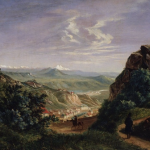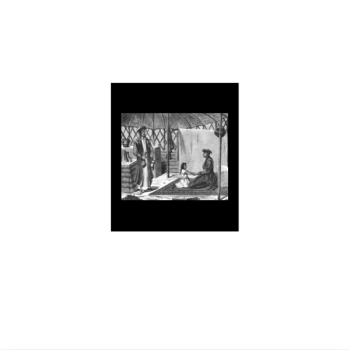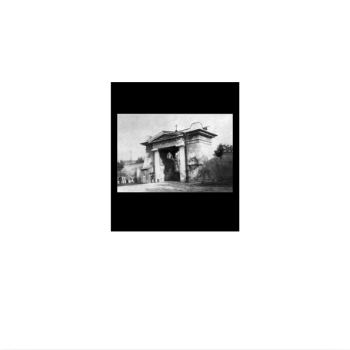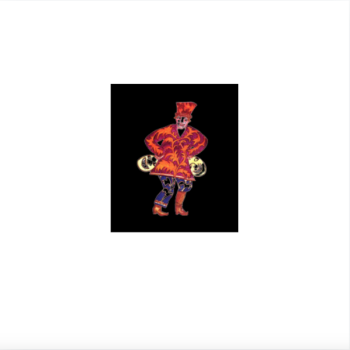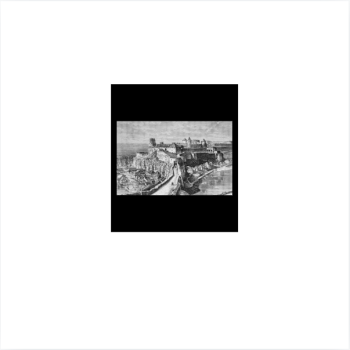DUELLISTES
Following a petition from Timiryazev, Count Bludov summoned Andrei Mikhailovich to St. Petersburg to explain many inconsistencies in the new “Regulations on the Administration of the Kalmyks, 1835” and the necessary corrections it required. At the beginning of 1837, he set off for St. Petersburg, taking Rostya with him to enroll him in the artillery school, and also Katya, who wanted to visit the capital and see her older sister. The first leg of the journey took them from Saratov to Penza, where they found Prince Pavel Vasilyevich, seriously ill. He had already been confessed, as well as given communion and unction. The doctors were expecting him to pass away at any minute, but meeting with his son-and-law and grandchildren made the old man so happy, that he seemed to come to life. He asked about his daughter, told stories, and became even more cheerful and invigorated. He did not let the family leave his bed all day and spent the night peacefully. The following day he was also cheerful and lively, asking the Fadeevs not to worry about his illness. He talked a lot and made jokes (especially with Katya,) told interesting things from the past and anecdotes about his friends (Olenin, Poluektov, and others,) and still did not let them leave his side.
At eleven o’clock that night, when Adrei Mikhailovich and the children were having dinner in the room next to his bedroom, the prince asked to straighten his pillow. They barely had time to do this when he instantly died, without a sigh, without a groan, only slightly moving his shoulder. He had just spoken to them, there was so much life in his voice; his memory was so fresh that they did not believe their eyes, did not believe that such a thing could happen so soon. He was over eighty years old, and for four years he had been completely blind. The doctors said that, given the course of his illness and exhaustion of strength, he should have died before their arrival, but the anticipation of this reunion, the strong desire to see them again, and then the joy of meeting, had somehow miraculously supported him for several days. It seems that fate brought the Fadeevs to Penza at this very time as if to close the prince’s eyes and pay their last respects.
Prince Pavel Vasilyevich expressed a desire to be buried in the village church, on his estate of Kutlya, near his sister Ekaterina Vasilyevna Kozhina (forty miles from Penza,) and on February 5, in severe frost, along a bad snowy road, they carried him to his final resting place. They were accompanied by a huge crowd of Penza residents of all classes, who saw the body of their long-time friend and respected elder carried far beyond the city. Several miles from Kutlya, the entire village came out to meet the funeral procession. In all the peasants one could see true love for their late, kind landowner and genuine grief at his loss. They took the coffin in their arms and carried it to the church, where the next day, after the funeral liturgy and requiem, the body was committed to the earth.
Under these circumstances, Andrei Mikhailovich was very worried about how his death would affect his poor Elena Pavlovna, especially with her ill health. She was left alone in Astrakhan with a small daughter, and no matter how carefully he tried to tell her this sad news, the misfortune could not be lessened and knowing her impressionable nature and attachment to her father, Andrei Mikhailovich could not relax until he received an answer from her. As he had hoped, God strengthened Elena Pavlovna and, although deeply shaken, she bore this loss with firmness and prudence.
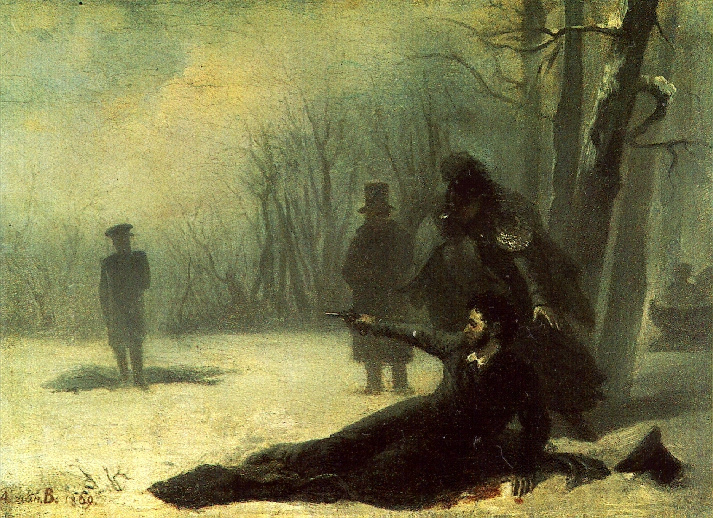
“Duel of Pushkin and d’Anthes.” Adrian Volkov (1869.)
Having finished their sad troubles, Andrei Mikhailovich and the children left Kutlya on February 7 and continued their journey to Moscow, where they stayed for several days. Here we learned of Pushkin’s tragic death. The poet, they learned, was killed in a pistol duel near the Black River in St. Petersburg. The family mourned as though they had lost one of their own. Katya wept inconsolably as many Russians (especially ladies.) The loss for Russian literature was irreplaceable. They arrived in St. Petersburg on February 19 and settled very comfortably in the apartment of Helena Andreevna and Pyotr Alekseevich.
Meanwhile, Elena Pavlovna’s letters worried Andrei Mikhailovich. She had long suffered from weak eyesight, and now, perhaps from her tears after her father’s death, this suffering had increased. The Astrakhan doctors had frightened her, and she was afraid of going blind like her father. Andrei Mikhailovich and the children insisted that she come to them in St. Petersburg at once to consult with the best ophthalmologists, but she did not agree and wrote to them that she preferred to wait for their return and go with the children to Pyatigorsk to be treated by the mineral waters.
Andrei Mikhailovich learned during his meeting that Count Bludov did not have much confidence in Timiryazev’s assurances regarding the Kalmyk administration. The “1835 Regulations on the Kalmyks” had been drawn up by Count Bludov himself, and he looked at everything from his own point of view, imagining the life of the Kalmyks according to his ideal, and not at all as it actually existed. However, in conversations with Andrei Mikhailovich on this subject, Count Bludov did not go into detailed questions but limited himself to more superficial ones, and even then with visible impatience and haste, under the pretext of the need to go to the palace, to the council, etc. Perhaps the reason for this cooling towards his brainchild, the “Kalmyk Regulations,” was the known transfer of this administration to the department of the new Minister of State Property, Count Kiselev. Whatever the case was, Andrei Mikhailovich’s trip brought little benefit for the Kalmyk people. Andrei Mikhailovich became better acquainted with Count Kiselev, who was very concerned with the organization of state settlers (which were to include Kalmyks.)
Andrei Mikhailovich often visited Count Kiselev and the directors of his departments (especially the Secretary of State, Egor Vasilyevich Karneev, who enjoyed his great confidence.)[2] Soon after his arrival, Andrei Mikhailovich unexpectedly received an urgent invitation from Count Alexander Grigorievich Stroganov, the Governor-General of Little Russia (and co-creator of “Beef Stroganoff,”) to go into his service and live in Poltava.[3] The proposed position was not bad, but after some thought, Andrei Mikhailovich decided not to accept the offer. Unaware of the outcome of this meeting, Count Kiselev tried to persuade Andrei Mikhailovich to serve in the new administration of the state peasants and asked Count Bludov for permission to transfer him. This briefly caused some tension, as Count Bludov thought Andrei Mikhailovich was the one seeking transfer; but the displeasure passed when he explained himself. A few days later Count Bludov announced that he intended to create a special post that would benefit all parties. Indeed, a few days later Count Bludov instructed Andrei Mikhailovich to examine more closely the Kalmyk uluses and the Saratov German colonies; and before his departure back to Astrakhan, Count Kiselev, by agreement with Count Bludov, entrusted him with the additional task of inspecting the settlements and state property of the Astrakhan province and the Caucasus region. Upon completion of these commissions, he was to return to St. Petersburg in the winter to submit a report on them. They gave Andrei Mikhailovich a decent amount of money for travel expenses, and also gave him two officials, the court councilors Frank and Neidgart, to help assist him in his work.
The capital’s amusements never attracted Andrei Mikhailovich much before, and now he had no time for them, nevertheless, he encouraged his daughters to enjoy the pleasures of St. Petersburg, which they did very willingly (especially for Katya, as everything here was new and curious.) Once they persuaded their father to go with them to the theater to see Robert the Devil (but he did not stay until the end.) Rostya mostly stayed at home with his books and geographical maps and was interested only in museums, arsenals, art galleries, and antiquities. (Rostya was distinguished since childhood by a philosophical disposition and always liked to stay at home.) To prepare Rostya for entering the artillery school, Andrei Mikhailovich placed him with his nephew, Alexander Alexandrovich Fadeev, who served in the Artillery Guards and was one of the best teachers in that same school. He was an excellent officer and knew his business well; he promised to prepare Rostya for the New Year. Pavel Mikhailovich (Andrei’s brother,) an artillery general, who was constantly on duty in St. Petersburg, was also ready to provide him with any assistance and participation. When it was time to leave, it was difficult to part with Rostya and leave him alone in a strange place. It was also hard for the poor boy to be separated from them, to be torn away from his own family.
Around the same time, Pyotr Alekseevich was appointed Commander of the 6th Cavalry Artillery Battery in the village of Kamensky in the Ekaterinoslav District.[4] Rather than go with her husband, Helena Andreevna decided to accompany her father and take the girls along to Pyatigorsk. Before she made her departure from St. Petersburg, Osip Ivanovich, burst into copious tears in the presence of Katya, Crying, he begged Elena Andreevna not to leave.[5] “He was undoubtedly a remarkably intelligent and unusually witty man,” Andrei Mikhailovich would say, “but in conversations with him there was something repulsive about him.”[6]
-
- NOVOROSSIYA
- The Arbiter Of Europe’s Destiny.
- The House Dolgorukuy
- Madame Krüdener
- Ekaterinoslav
- The Arabat Arrow
- The Mystery Of General Inzov
- The Doukhobors
- Pushkin
- Chuguev Military Settlement
- “The Blessed”
- The Decembrists
- Penza
- Independence
- Last Words Of Samuel Khristianovich Kontenius
- “Amid Coffins And Desolation”
- Rusalka
- Dead Souls
- Secret Passages
- Astrakhan
- Nevsky Prospekt
- Kalmyk Ulus
- Love And Ambition
- Duellistes
- Pyatigorsk
- A Heroine Of Our Time
- Winter Palace
- Zeneida R-Va
- Steppes
- Letter To Natalya
- Fire And Ice
SOURCES:
[1] “[Egor Vasilyevich Karneev,] lieutenant general, senator, born in 1773, died January 17, 1849 […] In 1830, he was ordered to inspect the Lugansk foundry and find local means to improve it; in 1836, Karneyev was sent to the Crimea and the Bessarabian salt lakes to inspect the local salt production. Transferred in 1834 to the corps of mining engineers as a lieutenant general, he repeatedly served as chief of staff of the corps of mining engineers. On April 18, 1837, he was dismissed from his positions as director of the Department of Mining and Salt Affairs and the Mining Cadet Corps and was granted the title of senator, with the appointment to be present in the Land Survey Department of the Senate.” [Polovtsov, A. A. Russian Biographical Dictionary. Vol. VIII. Ibak-Klyucharyov. Imperial Russian Historical Society. St. Petersburg, Russia. (1897): 531-532.]
[2] “[Alexander Grigorievich Stroganov (1795-1891,)] Count, Adjutant General, member of the State Council. He was educated in the corps of railway engineers; having joined the Life Guards Artillery Brigade, he took part in the battles of Dresden, Kulm, Leipzig; was present at the occupation of Paris; in 1831 he took part in the suppression of the Polish uprising. In 1834, S. was appointed Deputy Minister of Internal Affairs. In 1836-1838 he was Governor-General of Chernigov, Poltava and Kharkov, and from 1839 to 1841 he managed the Ministry of Internal Affairs. From 1849 he was a member of the State Council. After spending a year (1854) as the military governor of St. Petersburg, he then spent about 9 years as the governor-general of Novorossiysk and Bessarabia. During his stay in Odessa, Count S. was interested in the activities of the local Society of History and Antiquities of Russia, was its president and made many valuable donations to the museum. Its enormous library was bequeathed to Tomsk University.” [(ed.) Andreevsky, Ivan Efimovich. Brockhaus And Efron Encyclopedic Dictionary: Vol. XXXI. I. A. Efron Joint-Stock Publishing Company. St. Petersburg, Russia. (1901): 803-805.] For the “Beef Stroganoff” story see: [Volokh, Anne; Manus, Mavis. The Art of Russian Cuisine. Macmillan. New York, New York. (1983): 266.]
[3] “Letters From P. A. Hahn To G. V. Nechaev.” Letter 1. Dated June 5, 1836. [Stary Oskol.] [Bahmut Roerich Center.]
[4] Nekrasova, E. S. “Helena Andreyevna Hahn (1814-1842): Part I.” Russkaia Starina. Vol. LI, No. 8 (August 1886): 335-354; Nekrasova, E. S. “Helena Andreyevna Hahn (1814-1842): Part II.” Russkaia Starina. Vol. LI, No. 9 (September 1886): 553-574; Zhelikhovskaya, Vera Petrovna. “Helena Andreyevna Hahn (1835-1842.)” Russkaia Starina. Vol. LII, No. 3 (March 1887): 733-766.
[5] Fadeyev, Andrei Mikhailovich. Vospominaniia: 1790-1867. Vysochaishe Utverzhd. Yuzhno-Russkago. Odessa, Ukraine. [Russian Empire.] (1897): Part I: 125-129.



